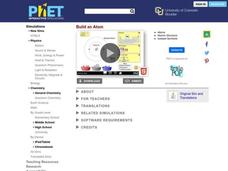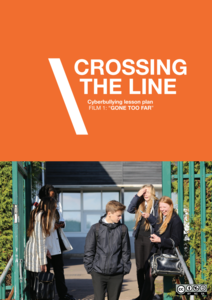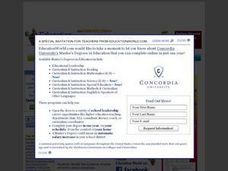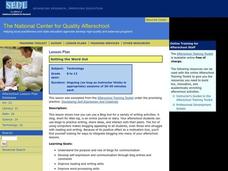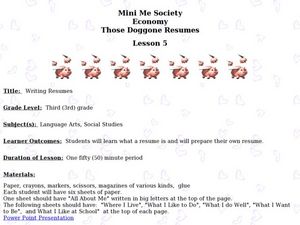K5 Learning
Treasure Hunt
After reading about a book that leads two friends on a treasure hunt, class members respond to four short answer reading comprehension questions. Skills include describing the characters, retelling the story in their own words, writing...
Nemours KidsHealth
Human Body Series: Immune System
When you work with school children, teaching about immunity and illness prevention is a priority! This approach includes a discussion, kid-friendly online articles, a creative writing assignment, and a quiz on the role of leukocytes and...
PBS
Stories of Painkiller Addiction: Prescription Drug Abuse Awareness Campaign
The I-STOP law was designed to regulate the distribution and tracking of prescription drugs. After reading an article about its signing and implementation, middle and high schoolers work together to come up with their own ideas for an...
Baylor College
Energy for Life (Energy from Food)
Energy comes in many forms, but how do living things get the energy they need to survive and thrive? In a simple, controlled experiment with yeast, water, and sugar, groups make observations about how yeast reacts with water alone, then...
PHET
Build an Atom
Scholars build specific elements by creating a model of its atomic structure. Objects they can include are protons, nuetrons, electrons, orbits, clouds, charge, and mass number. Simulation ends with questions to challenge individuals'...
Childnet International
Crossing the Line: Cyberbullying
Members of the LGBTQ community are more likely to be bullied online than their peers—and bystanders who do nothing can be as problematic as the bullies themselves. Middle schoolers explore ways to protect themselves and others on the...
Art Educators of New Jersey
Exploring Eric Carle’s Painted Collage
Where does inspiration come from? Where do writers get their ideas? What about visual artists? A PowerPoint and a video introduce middle schoolers to children's author and illustrator Eric Carle and how he found inspiration in the work...
Baylor College
Microbes and Disease
Discuss how diseases have impacted human history. Divide your class into groups and assign each group one of the following: tuberculosis, malaria, plague, cholera, smallpox, and AIDS. They read up on, complete a concept map, and present...
Scholastic
Frindle Lesson Plan
"Who says a pen has to be called a pen? Why not call it a frindle?" Inspired by this quote from the award-winning novel written by Andrew Celements, this lesson allows children to invent their own terms for common classroom objects,...
Civil War Trust
Genealogy
The Civil War is undoubtedly a part of America's history, but could it be part of your pupils' history as well? Middle schoolers conduct research to discover a connection between their ancestors and the American Civil War. Whether they...
Global Oneness Project
Deconstructing Consumerism
A short, engaging video provides a critique of the hyper-consumerist mentality that many think have taken over the Western world. After watching the video, pupils reflect on their own habits and use evidence to respond to discussion and...
Curated OER
Where in the World Is That Volcano?
Identify the Earth's major volcanoes with an earth science lesson plan. Elementary and middle schoolers locate major volcanoes on a world map. Then, in groups, they research how the volcano affects the region in which it is located.
Texas State Energy Conservation Office
Investigation: Insulation
Youngsters compare the heat-holding abilities of three different cans by insulating two with different materials and measuring the temperature change of hot water over a 20-minute period.
Virginia Department of Education
Modeling Division of Fractions
Provide a meaningful context for learning about the division of fractions with this upper-elementary math lesson. Presented with a simple, real-world problem, young mathematicians work in small groups to develop visual models that help...
Virginia Department of Education
Integers: Addition and Subtraction
Young mathematicians construct their own understanding of integers with an inquiry-based math lesson. Using colored chips to represent positive and negative numbers, children model a series of addition and subtraction problems as they...
Pearson
Advice: Should, Shouldn't, Ought to, Had Better, and Had Better Not
You shouldn't miss out on an opportunity to review should, shouldn't, ought to, had better, and had better not! Elementary and middle schoolers view a slideshow presentation that focuses on usage rules and examples for these tricky verbs.
Curated OER
The Memory Invention
Young writers edit their writing to make sure it shows good meaning and clarity. In this writing lesson plan, students are given a variety of "What If?" scenarios to choose from as writing prompts. A class discussion ensues, which...
Curated OER
My Mind is Blank
Investigate prewriting activities in this brainstorming lesson. Middle schoolers are divided into groups and are assigned a topic. They decide which prewriting technique to choose from, including free write, looping, brainstorming,...
Curated OER
Getting the Word Out
Discuss and generate blogs in this technology lesson. Middle and high schoolers explore examples of blogs and create their own blogs. Use this lesson throughout the year to reinforce concepts from your language arts class (or any class)....
Curated OER
Mini Me Society Economy Those Doggone Resumes
Third graders practice writing resumes. In this resume lesson, 3rd graders discover the attributes of resumes, complete an activity that exhibits their likes, and write their own resume as they follow the model provided in a PowerPoint...
Curated OER
Responses to Literature
Middle and high schoolers hone their writing skills by reading Rikki-Tikki-Tavi and the poem Sarah Cynthia Sylvia Stout Would Not Take the Garbage Out. They fill out a graphic organizer (included here), and use the organizer to write an...
Curated OER
Editing
Explore the writing process by reviewing previously written work. First, middle schoolers analyze a handout in which they must read the text and correct the mistakes with an editing checklist. They proofread their editing and share their...
Curated OER
Down in the Dumps
After an introduction to municipal sludge, middle school ecologists consider the pros and cons of dumping in the Hudson River Canyon. The class is split into two groups: one to debate in favor or dumping and one to debate against the...
Curated OER
Air, Air Everywhere! Lesson 2: Acid Rain
Middle school environmentalists record the pH of four different liquids, including two aerosol cleaning products. They liken the products to acid rain and speculate in writing which might affect the human respiratory system. Although...
Other popular searches
- Writing Fables Middle School
- Middle School Writing Skills
- Middle School Writing Odes
- Writing Poetry Middle School
- Middle School Writing Plots






